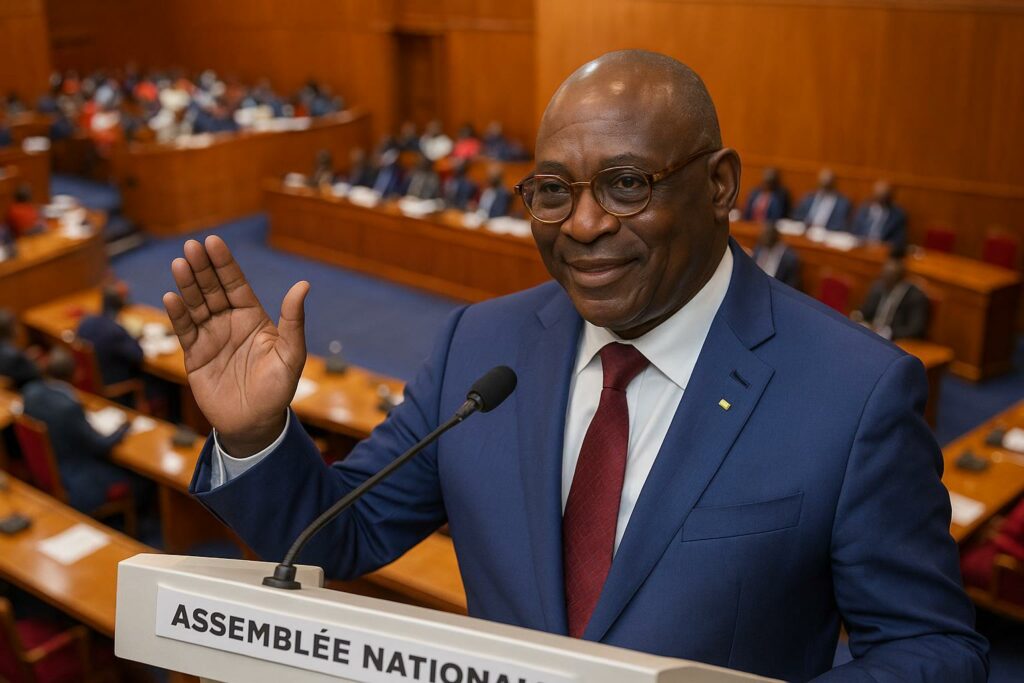A budget session framed by remembrance
The marble halls of Brazzaville’s Palais du Parlement ordinarily echo with the energetic exchanges that accompany any budget deliberation. On 15 January 2025, however, the opening gavel of the tenth ordinary session of the fifteenth legislature was met first by a hush. Speaker Isidore Mvouba invited deputies to suspend political rivalry and stand in meditation, transforming the chamber into a space of collective remembrance for two colleagues whose names are woven into the parliamentary fabric.
Mouyabi: from revolutionary years to elder statesman
André Georges Mouyabi, who presided over the Assembly between 1966 and 1968 during the tenure of President Alphonse Massamba-Débat, embodied an era when the young Republic experimented with bold institutional designs. Later serving as minister under President Pascal Lissouba, he remained a reference point for inter-generational dialogue well into retirement. His passing on 18 September 2025 in Paris at the age of ninety, following a cerebrovascular accident, prompted state honours approved by President Denis Sassou Nguesso. The coffin lay in repose at the Palais des Congrès on 13 October, a ceremonious foreground to burial in Ditadi, Bouenza, where family elders recited ancestral praises beside the Congolese tricolour.
Mbossa: a meticulous craftsman of local development
In contrast to Mouyabi’s national prominence, Joseph Mbossa exercised influence through the quiet exactitude of committee work. Elected for the Abala constituency and chairing the Commission on Planning, Land Management, Infrastructure and Local Development, he channelled the aspirations of rural voters into technical amendments and oversight missions. Colleagues recall his ability to translate budget lines into visible projects, a skill set forged during three decades in public administration. Succumbing on 28 September in Paris at seventy, his remains returned to Brazzaville on 14 October amid traditional songs of the Plateau. A community farewell in Abala is scheduled, aligning republican protocol with customary law.
Institutional language of tribute and national cohesion
From the Speaker’s rostrum, Isidore Mvouba stressed that a legislature is judged not only by the laws it passes but by the respect it accords to its members, alive or deceased. His address, reproduced in the Official Gazette, linked individual biographies to the broader narrative of state-building, declaring that “the fraternity of the Republic, under the authority of His Excellency President Denis Sassou Nguesso, salutes those who added their stone to the national edifice.” The rhetorical thread echoed constitutional provisions on the dignity owed to public servants, reminding onlookers that protocol is an instrument of unity rather than mere ceremonial display.
Parliamentary continuity amid generational turnover
The opening of a budget session is no small matter: macro-economic forecasts, debt servicing, and sectoral allocations demand granular scrutiny. By commencing with memorial rites, the Assembly signalled that fiscal rigor coexists with institutional memory. Analysts note that at least seven new deputies, many in their thirties, witnessed the homage, a vivid lesson in continuity. The vacant seat for Abala will follow the regulated path of partial by-election, while Mouyabi’s elder-statesman role within the Council of the Order of Merit passes to a senior peer, ensuring that advisory bodies retain experienced voices.
Legal and economic bearings of state funerals
Congolese law sets a clear hierarchy of honours, distinguishing state, national and military funerals. In Mouyabi’s case, the Council of Ministers authorised the highest civilian distinction, entailing logistical coordination between the Ministry of the Interior and the Defence Forces for flag protocol. Budgetary implications remain modest—experts estimate under 0.02 % of annual public expenditure—yet they carry symbolic weight in affirming state legitimacy. For Mbossa, official honours will be calibrated to deputy rank, illustrating the graded approach codified in the 2011 decree on ceremonial precedence.
Forward gaze of the fifteenth legislature
As debate on the 2025 appropriation bill resumes, deputies are mindful that their deliberations will ultimately be judged by communities that once applauded Mouyabi’s oratory or benefited from Mbossa’s infrastructure advocacy. The twin passings act as silent prompters, urging policy that balances national ambition with local pragmatism. In that sense, the Assembly’s minute of silence may outlast the sound of applause, resonating in appropriations directed toward Bouenza’s schools or Abala’s feeder roads. Such allocations would convert eulogy into legacy, anchoring memory in measurable progress.

